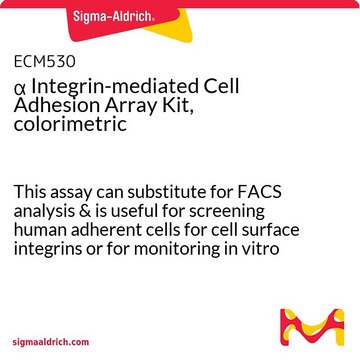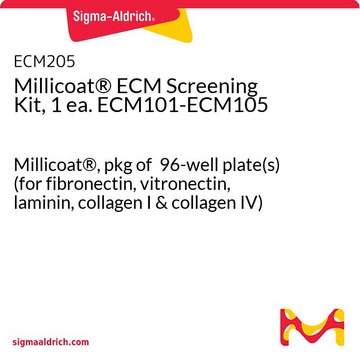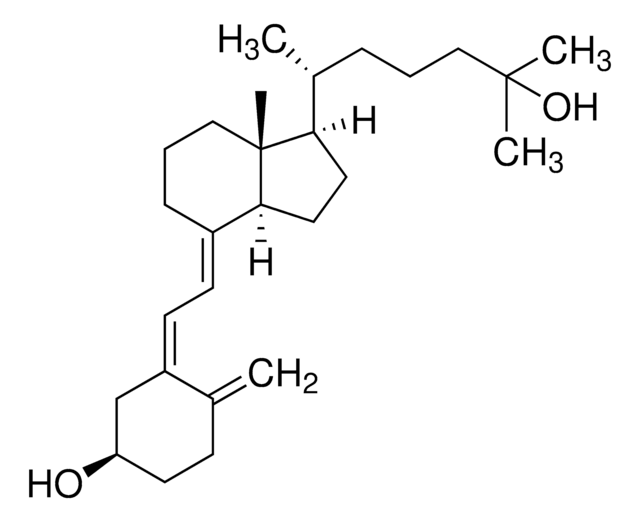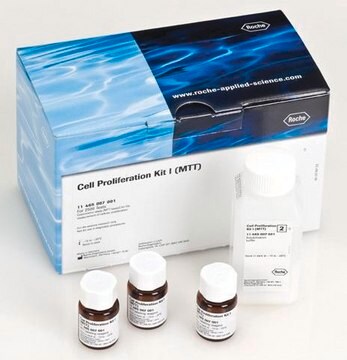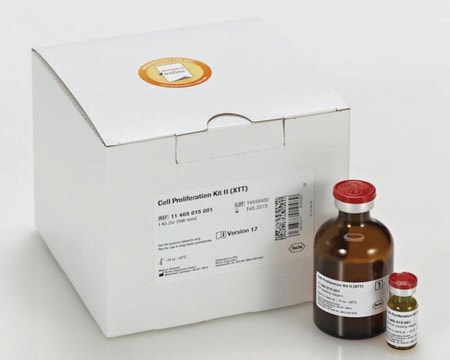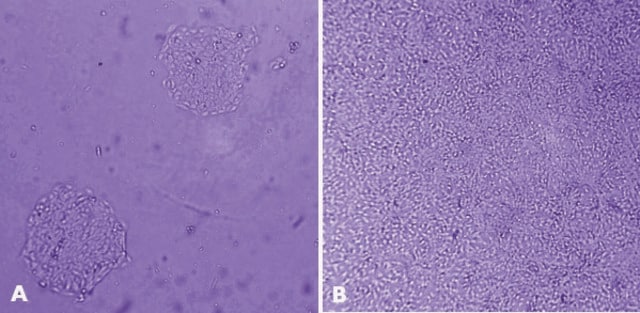ECM531
β Integrin-mediated Cell Adhesion Array Kit, colorimetric
This assay can substitute for FACS analysis & is useful for screening human adherent cells for cell surface integrins or for monitoring in vitro cell differentiation or genetic modification of cells.
ログイン組織・契約価格を表示する
すべての画像(1)
About This Item
UNSPSCコード:
12352207
eCl@ss:
32161000
NACRES:
NA.84
おすすめの製品
品質水準
交差性
human
メーカー/製品名
Chemicon®
テクニック
cell based assay: suitable
検出方法
colorimetric
輸送温度
wet ice
遺伝子情報
human ... ITGB1(3688)
詳細
Introduction:
Cell adhesion plays a major role in cellular communication and regulation, and is of fundamental importance in the development and maintenance of tissues. A family of cell surface receptors, the integrins, mediates cell attachment to proteins of the extracellular matrix. Integrins are heterodimer molecules containing an alpha and beta transmembrane glycoprotein subunit that are non-covalently bound together (1-2). Historically, antibodies have been used to determine the integrin profiles of cells by immunoprecipitation, immunofluorescence, immunoblotting, and flow cytometry. These methods are time-consuming, laborious or require sophisticated equipment.
The CHEMICON® Beta Integrin-Mediated Cell Adhesion Array kit is designed as a cost effective, efficient method for identification of cell surface integrins. The kit format uses 12 x 8-well removable strips in a plate frame for convenience and flexibility in designing assays. The Integrin-Mediated Cell Adhesion Array can be completed within 1-2 hours, providing a rapid, quantitative assay for the characterization of beta integrin surface expression.
In addition, Chemicon continues to provide numerous migration, invasion, and adhesion products including:
· Alpha Integrin-Mediated Cell Adhesion Array (ECM530)
· Alpha/Beta Integrin-Mediated Cell Adhesion Array Combo Kit (ECM532)
· QCM 8μm 96-well Chemotaxis Cell Migration Assay (ECM510)
· QCM 5μm 96-well Chemotaxis Cell Migration Assay (ECM512)
· QCM 3μm 96-well Chemotaxis Cell Migration Assay (ECM515)
· QCM 96-well Cell Invasion Assay (ECM555)
· 24-well Insert Cell Migration and Invasion Assay Systems
· CytoMatrix Cell Adhesion strips (ECM protein coated)
· QuantiMatrix ECM protein ELISA kits
Test Principle:
The CHEMICON Beta Integrin-Mediated Cell Adhesion Array uses mouse monoclonal antibodies generated against human beta integrins/subunits (Ãeta1, Ãeta2, Ãeta3, Ãeta4, Ãeta6, alphaVÃeta5, and alpha5Ãeta1), that are immobilized onto a goat anti-mouse antibody coated microtiter plate. The plate is then used to capture cells expressing these integrins on their cell surface; goat anti-mouse antibody coated wells are provided as a negative assay control. Each strip (8 wells total) consists of 7 integrin antibody coated wells and one negative control well (see plate layout on page 3). Experimental cells are seeded onto the coated substrate and incubated. Subsequently, unbound cells are washed away, and adherent cells are fixed and stained. Relative cell attachment is determined using absorbance readings.
Additional information about the monoclonals provided in the kit:
*Mouse anti-Beta 1 [CD29], clone P4G11, (Hu, Mky, Rb)
*Mouse anti-Beta 2 [CD18], clone P4H9, (Hu)
*Mouse anti-Beta 3 [CD61], clone 25E11, (Hu)
*Mouse anti-Beta 4 [CD104], clone ASC-9, (Hu)
*Mouse anti-Beta 6, clone CSb6, (Hu, Rt, Mky, Rb)
*Mouse anti-Alpha V/ Beta 5 [CD51/CD61], clone P1F6, (Hu, Chk)
*Mouse anti-Alpha 5/ Beta 1 [VLA5, FNR], clone HA5, (Hu, Por)
Cell adhesion plays a major role in cellular communication and regulation, and is of fundamental importance in the development and maintenance of tissues. A family of cell surface receptors, the integrins, mediates cell attachment to proteins of the extracellular matrix. Integrins are heterodimer molecules containing an alpha and beta transmembrane glycoprotein subunit that are non-covalently bound together (1-2). Historically, antibodies have been used to determine the integrin profiles of cells by immunoprecipitation, immunofluorescence, immunoblotting, and flow cytometry. These methods are time-consuming, laborious or require sophisticated equipment.
The CHEMICON® Beta Integrin-Mediated Cell Adhesion Array kit is designed as a cost effective, efficient method for identification of cell surface integrins. The kit format uses 12 x 8-well removable strips in a plate frame for convenience and flexibility in designing assays. The Integrin-Mediated Cell Adhesion Array can be completed within 1-2 hours, providing a rapid, quantitative assay for the characterization of beta integrin surface expression.
In addition, Chemicon continues to provide numerous migration, invasion, and adhesion products including:
· Alpha Integrin-Mediated Cell Adhesion Array (ECM530)
· Alpha/Beta Integrin-Mediated Cell Adhesion Array Combo Kit (ECM532)
· QCM 8μm 96-well Chemotaxis Cell Migration Assay (ECM510)
· QCM 5μm 96-well Chemotaxis Cell Migration Assay (ECM512)
· QCM 3μm 96-well Chemotaxis Cell Migration Assay (ECM515)
· QCM 96-well Cell Invasion Assay (ECM555)
· 24-well Insert Cell Migration and Invasion Assay Systems
· CytoMatrix Cell Adhesion strips (ECM protein coated)
· QuantiMatrix ECM protein ELISA kits
Test Principle:
The CHEMICON Beta Integrin-Mediated Cell Adhesion Array uses mouse monoclonal antibodies generated against human beta integrins/subunits (Ãeta1, Ãeta2, Ãeta3, Ãeta4, Ãeta6, alphaVÃeta5, and alpha5Ãeta1), that are immobilized onto a goat anti-mouse antibody coated microtiter plate. The plate is then used to capture cells expressing these integrins on their cell surface; goat anti-mouse antibody coated wells are provided as a negative assay control. Each strip (8 wells total) consists of 7 integrin antibody coated wells and one negative control well (see plate layout on page 3). Experimental cells are seeded onto the coated substrate and incubated. Subsequently, unbound cells are washed away, and adherent cells are fixed and stained. Relative cell attachment is determined using absorbance readings.
Additional information about the monoclonals provided in the kit:
*Mouse anti-Beta 1 [CD29], clone P4G11, (Hu, Mky, Rb)
*Mouse anti-Beta 2 [CD18], clone P4H9, (Hu)
*Mouse anti-Beta 3 [CD61], clone 25E11, (Hu)
*Mouse anti-Beta 4 [CD104], clone ASC-9, (Hu)
*Mouse anti-Beta 6, clone CSb6, (Hu, Rt, Mky, Rb)
*Mouse anti-Alpha V/ Beta 5 [CD51/CD61], clone P1F6, (Hu, Chk)
*Mouse anti-Alpha 5/ Beta 1 [VLA5, FNR], clone HA5, (Hu, Por)
アプリケーション
Research Category
細胞骨格
細胞骨格
The CHEMICON® Beta Integrin-Mediated Cell Adhesion Array Kit can be used for assessing the presence or absence of specific integrins on the cell surface. This assay can substitute for FACS analysis (3) and is useful for screening human adherent cells for cell surface integrins or for monitoring in vitro cell differentiation or genetic modification of cells.
For Research Use Only. Not for use in diagnostic procedures.
For Research Use Only. Not for use in diagnostic procedures.
This assay can substitute for FACS analysis & is useful for screening human adherent cells for cell surface integrins or for monitoring in vitro cell differentiation or genetic modification of cells.
包装
96 wells
構成
Beta Integrin Array Plate: (PN: 90600) One 96-well plate with 12 strips. Each strip contains one well each of the mouse anti-beta integrin monoclonal antibodies: (beta1, beta2, beta3, beta4, beta6, alphaVbeta5, and alpha5beta1), and one goat anti-mouse negative well. See the plate layout on product insert.
Cell Stain Solution: (Part No. 90144) One 20 mL bottle.
Extraction Buffer: (Part No. 90145) One 20 mL bottle.
Assay Buffer: (Part No. 90601) One 100 mL bottle.
Cell Stain Solution: (Part No. 90144) One 20 mL bottle.
Extraction Buffer: (Part No. 90145) One 20 mL bottle.
Assay Buffer: (Part No. 90601) One 100 mL bottle.
保管および安定性
The experimental and control plates can be stored at 2° to 8°C in the foil pouch up to their expiration. Unused strips may be placed back in the pouch for storage. Ensure that the desiccant remains in the pouch, and that the pouch is securely closed.
Precautions:
· Cell stain contains minor amounts of crystal violet, a toxic substance, which may cause cancer and heritable genetic damage. Handle with caution. Toxic by inhalation and if swallowed. Irritating to eyes, respiratory system and skin.
· Extraction buffer contains alcohol. Avoid internal consumption.
Precautions:
· Cell stain contains minor amounts of crystal violet, a toxic substance, which may cause cancer and heritable genetic damage. Handle with caution. Toxic by inhalation and if swallowed. Irritating to eyes, respiratory system and skin.
· Extraction buffer contains alcohol. Avoid internal consumption.
法的情報
CHEMICON is a registered trademark of Merck KGaA, Darmstadt, Germany
免責事項
Unless otherwise stated in our catalog or other company documentation accompanying the product(s), our products are intended for research use only and are not to be used for any other purpose, which includes but is not limited to, unauthorized commercial uses, in vitro diagnostic uses, ex vivo or in vivo therapeutic uses or any type of consumption or application to humans or animals.
シグナルワード
Danger
危険有害性情報
危険有害性の分類
Eye Irrit. 2 - Flam. Liq. 2
保管分類コード
3 - Flammable liquids
適用法令
試験研究用途を考慮した関連法令を主に挙げております。化学物質以外については、一部の情報のみ提供しています。 製品を安全かつ合法的に使用することは、使用者の義務です。最新情報により修正される場合があります。WEBの反映には時間を要することがあるため、適宜SDSをご参照ください。
毒物及び劇物取締法
キットコンポーネントの情報を参照してください
PRTR
キットコンポーネントの情報を参照してください
消防法
キットコンポーネントの情報を参照してください
労働安全衛生法名称等を表示すべき危険物及び有害物
キットコンポーネントの情報を参照してください
労働安全衛生法名称等を通知すべき危険物及び有害物
キットコンポーネントの情報を参照してください
カルタヘナ法
キットコンポーネントの情報を参照してください
Jan Code
キットコンポーネントの情報を参照してください
試験成績書(COA)
製品のロット番号・バッチ番号を入力して、試験成績書(COA) を検索できます。ロット番号・バッチ番号は、製品ラベルに「Lot」または「Batch」に続いて記載されています。
ライフサイエンス、有機合成、材料科学、クロマトグラフィー、分析など、あらゆる分野の研究に経験のあるメンバーがおります。.
製品に関するお問い合わせはこちら(テクニカルサービス)
